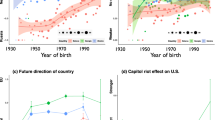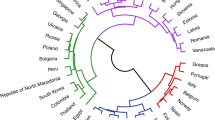Abstract
National democracy is a rare thing in human history and its stability has long been tied to the cultural values of citizens. Yet it has not been established whether changing cultural values made modern democracy possible or whether those values were a response to democratic institutions. Here we combine longitudinal data and cohort information of nearly 500,000 individuals from 109 nations to track the co-evolution of democratic values and institutions over the last century. We find that cultural values of openness towards diversity predict a shift towards democracy and that nations with low institutional confidence are prone to political instability. In addition, the presence of democratic institutions did not predict any substantive changes in the measured cultural values. These results hold accounting for other factors, including gross domestic product per capita and non-independence between nations due to shared cultural ancestry. Cultural values lead to, rather than follow, the emergence of democracy. This indicates that current stable democracies will be under threat, should cultural values of openness to diversity and institutional confidence substantially decline.
This is a preview of subscription content, access via your institution
Access options
Access Nature and 54 other Nature Portfolio journals
Get Nature+, our best-value online-access subscription
$29.99 / 30 days
cancel any time
Subscribe to this journal
Receive 12 digital issues and online access to articles
$119.00 per year
only $9.92 per issue
Buy this article
- Purchase on Springer Link
- Instant access to full article PDF
Prices may be subject to local taxes which are calculated during checkout


Similar content being viewed by others
Data availability
All raw data are publicly available from the following sources: World Values Survey (http://www.worldvaluessurvey.org/wvs.jsp), European Values Survey (https://europeanvaluesstudy.eu), Madison Project (https://www.rug.nl/ggdc/historicaldevelopment/maddison/releases/maddison-project-database-2018) and Polity IV project (https://www.systemicpeace.org/polity/polity4.htm).
Code availability
Code used to generate regression results and plots can be found in the Github repository: https://github.com/damianruck/Cultural_foundations_of_modern_democracies.
References
Norris, P. Democratic Deficit: Critical Citizens Revisited (Cambridge Univ. Press, 2011).
Inglehart, R. & Welzel, C. Modernization, Cultural Change, and Democracy: the Human Development Sequence (Cambridge Univ. Press, 2005).
Marshall, M. G., Gurr, T. R. & Jaggers, K. Polity IV Project Political Regime Characteristics and Transitions, 1800–2015 Dataset Users’ Manual (Centre for Systemic Peace, 2017).
de Tocqueville, A. Democracy in America (Saunders and Otley, 1835).
Putnam, R. Bowling alone: America’s declining social capital. J. Democr. 6, 65–78 (1995).
Woodbery, R. D. The missionary roots of liberal democracy. Am. Polit. Sci. Rev. 106, 244–274 (2012).
Claassen, C. Does public support help democracy survive? Am. J. Pol. Sci. https://doi.org/10.2139/ssrn.3045846 (2019).
Brunkert, L., Kruse, S. & Welzel, C. A tale of culture-bound regime evolution: the centennial democratic trend and its recent reversal. Democratization 26, 422–443 (2019).
Acemoglu, D. & Robinson, J. A. Why Nations Fail: The Origins of Power, Prosperity and Poverty (Profile, 2012).
Acemoglu, D., Johnson, S. & Robinson, J. A. The colonial origins of comparative development: an empirical investigation. Am. Econ. Rev. 91, 1369–1401 (2001).
Spaiser, V., Ranganathan, S., Mann, R. P. & Sumpter, D. J. T. The dynamics of democracy, development and cultural values. PLoS One 9, e97856 (2014).
Fukuyama, F. Social capital, civil society and development. Third World Q. 22, 7–20 (2001).
Almond, G. A. & Verba, S. The Civic Culture: Political Attitudes and Democracy in Five Nations (Princeton Univ. Press, 1963).
Newton, K. Political support: social capital, civil society and political and economic performance. Polit. Stud. 54, 846–864 (2006).
Dalton, R. J. & Shin, D. C. in The Civic Culture Transformed (eds Dalton, R. J. & Welzel, C.) 91–115 (Cambridge Univ. Press, 2014).
Woodley, M. A. & Bell, E. Consanguinity as a major predictor of levels of democracy. J. Cross Cult. Psychol. 44, 263–280 (2013).
Foa, R. S., Mounk, Y. & Inglehart, R. F. The danger of deconsolidation. J. Democr. 27, 5–17 (2016).
Inglehart, R. How solid is mass support for democracy—and how can we measure it? Polit. Sci. Polit. 36, 51–57 (2003).
Fails, M. D. & Pierce, H. N. Changing mass attitudes and democratic deepening. Polit. Res. Q. 63, 174–187 (2010).
Lingling Qi, L. & Doh Chull Shin, D. C. How mass political attitudes affect democratization: exploring the facilitating role critical democrats play in the process. Int. Polit. Sci. Rev. 32, 245–262 (2011).
Hofstede, G., Hofstede, G. J. & Minkov, M. Cultures and Organizations. Software of the Mind: Intercultural Cooperation and its Importance for Survival (McGraw-Hill, 2010).
Welzel, C., Inglehart, R. & Kruse, S. Pitfalls in the study of democratization: testing the emancipatory theory of democracy. Br. J. Polit. Sci. 47, 463–472 (2017).
Wagner, A. F., Schneider, F. & Halla, M. The quality of institutions and satisfaction with democracy in Western Europe—a panel analysis. Eur. J. Polit. Econ. 25, 30–41 (2009).
Ruck, D. J., Bentley, R. A. & Lawson, D. J. Religious change preceded economic change in the 20th century. Sci. Adv. 4, eaar8680 (2018).
World Value Survey—What We Do (WVS, 2019).
European Values Study (EVS, 2011).
Inglehart, R. Changing values among Western publics from 1970 to 2006. West Eur. Polit. 31, 130–146 (2008).
Grusec, J. E. & Kuczynski, L. Parenting and Children’s Internalization of Values: A Handbook of Contemporary Theory (J. Wiley, 1997).
Sears, D. O. & Funk, C. L. Evidence of the long-term persistence of adults’ political predispositions. J. Polit. 61, 1–28 (1999).
House, B. R. et al. Ontogeny of prosocial behavior across diverse societies. Proc. Natl Acad. Sci. USA 110, 14586–14591 (2013).
Henrich, N. & Henrich, J. Why Humans Cooperate: A Cultural and Evolutionary Explanation (Oxford Univ. Press, 2007).
Lipset, S. M. Some social requisites of democracy: economic development and political legitimacy. Am. Polit. Sci. Rev. 53, 69–105 (1959).
Epstein, D. L., Bates, R., Goldstone, J., Kristensen, I. & O’Halloran, S. Democratic transitions. Am. J. Pol. Sci. 50, 551–569 (2006).
Bolt, J., Timmer, M. & van Zanden, J. L. in How Was Life? Global Well-Being Since 1820 (eds. van Zanden, J. L., Baten, J., d’Ercole, M. M., Rijpma, A., Smith, C. & Timmer, M.) 57–72 (OECD, 2014).
Matthews, L. J., Passmore, S., Richard, P. M., Gray, R. D. & Atkinson, Q. D. Shared cultural history as a predictor of political and economic changes among nation states. PLoS One 11, e0152979 (2016).
Pettigrew, T. F. & Tropp, L. R. A meta-analytic test of intergroup contact theory. J. Pers. Soc. Psychol. 90, 751–783 (2006).
Norris, P. & Inglehart, R. Cosmopolitan Communications: Cultural Diversity in a Globalized World (Cambridge Univ. Press, 2009).
Huggins, C. M. & Debies-Carl, J. S. Tolerance in the city: the multilevel effects of urban environments on permissive attitudes. J. Urban Aff. 37, 255–269 (2015).
Berggren, N. & Nilsson, T. Globalization and the transmission of social values: the case of tolerance. J. Comp. Econ. 43, 371–389 (2015).
Goldstone, J. A. et al. A global model for forecasting political instability. Am. J. Pol. Sci. 54, 190–208 (2010).
Confidence in Institutions https://news.gallup.com/poll/1597/confidence-institutions.aspx (Gallup, 2018).
Lührmann, A. et al. V-Dem Annual Democracy Report 2019: Democracy Facing Global Challenges (V-Dem Institute, 2019).
Hammarström, H., Forkel, R. & Haspelmath, M. Glottolog 3.3. Jena: Max Planck Institute for the Science of Human History (Glottolog, 2018).
Lewis, M. P. Ethnologue, Languages of the World (SIL International, 2009).
Acknowledgements
D.J.R. is funded by the College of Arts and Sciences, the Office of Research and Engagement and the US National Science Foundation (grant no. ACI-1430508). The funders had no role in the conceptualization, design, data collection, analysis, decision to publish or preparation of the manuscript.
Author information
Authors and Affiliations
Contributions
D.J.R., T.K. and L.J.M. performed data analysis. D.J.K., L.J.M., T.K., Q.D.A. and R.A.B. wrote the paper.
Corresponding author
Ethics declarations
Competing interests
The authors declare no competing interests.
Additional information
Peer review information Primary Handling Editor: Stavroula Kousta.
Publisher’s note Springer Nature remains neutral with regard to jurisdictional claims in published maps and institutional affiliations.
Supplementary information
Supplementary Information
Supplementary Methods, Supplementary Results, Supplementary Figs. 1–11 and Supplementary Tables 1–15.
Rights and permissions
About this article
Cite this article
Ruck, D.J., Matthews, L.J., Kyritsis, T. et al. The cultural foundations of modern democracies. Nat Hum Behav 4, 265–269 (2020). https://doi.org/10.1038/s41562-019-0769-1
Received:
Accepted:
Published:
Issue Date:
DOI: https://doi.org/10.1038/s41562-019-0769-1
This article is cited by
-
Epidemic risk perceptions in Italy and Sweden driven by authority responses to COVID-19
Scientific Reports (2022)
-
Cultural values predict national COVID-19 death rates
SN Social Sciences (2021)
-
A cultural theory of regimes
Nature Human Behaviour (2019)



